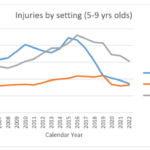






New Study Finds Intensive Parenting is Best…Or Does It?
“Parents Are Highly Involved in their Adult Children’s Lives and Fine With It,” declared the front page of The New York Times. Added the subhead: “New surveys show that today’s intensive parenting has benefits, not just risks, and most young adults seem happy with it, too.”
Is that true? “Intensive parenting” is best, and kids love it, even into adulthood?
Well, it depends on what you consider “intensive.”
The article discussed a recent Pew survey that targeted a rather giant swath of young adults – people between the ages of 18 and 34. That is, everyone from high school seniors to working stiffs Googling “gum pain.” Separately, it surveyed parents of people that age (who are no doubt Googling gum issues themselves. And “Can’t sleep.” And “What tastes like bread but isn’t?”).
Is texting evidence of “intensive parenting”?
One of Pew’s key findings was that, “Parents are very involved in their young adult children’s lives.” It judged this in part by the fact that 73% of parents say they text their kids “at least a few times a week.”
If that’s very involved, I’m super involved with my sister, my friends, and my political discussion WhatsApp group (even though it drives me nuts!). But I wouldn’t say I intensively parent any of them. Texting is so easy and fast that texting family members “at least a few times a week” seems far more “normal communication” than “intensive parenting.”
As for the fact that young adults “turn to their parents for advice on jobs, finances and physical health at least sometimes.” Wouldn’t it be weird if they didn’t? And a little sad? And how are they supposed to find a good periodontist?
What about the case for parents stepping back?
I am on record as recommending that young kids do some exploring on their own without a communication device. That way if they get lost, or their bike chain falls off, they have to figure out what to do next. They can’t just call a parent. I dearly want them to develop some problem-solving skills and independence. Childhood is the time to do it.
Then, by the time they’re young adults, with any luck (truly a factor), they’re resourceful and capable. But that’s not the same thing as having a ton of resources, or being capable of everything. So they turn to us, not because we’re helicopters, but because we are happy to help.
Not every problem of young adulthood requires boot-strapping.
Is it “intensive parenting” to help out financially?
Ah, but the survey also found that many parents help their adult children out financially! They do this more so when the kids are 18-24 and less so as the years go by. Is that intensive parenting? Excessive assistance? Crippling with kindness? Well, as the Pew folks also point out: young adults are going to college in record numbers, and racking up record college debt. I’m not actually sure that college is the best path for everyone, but at the moment it’s still popular. So helping young folks get their financial footing doesn’t strike me as being a destructive “enabler.” Maybe because I’ve done it myself!
I know there are some who think that any assistance after a certain age is coddling. But I actually think it’s time to flip that. How?
The difference between “intensive parenting” and “helicoptering.”
Give them independence as kids. (Get our tips!) Let them play, explore, and take some small risks without adults always supervising. They’ll see that you believe in them. That helps them believe in themselves. You’re there for them without overprotecting. I realize there are a lot of fuzzy lines, but basically I’m talking about trust:
You trust that your kids can handle some things.
They trust that you’re there for them when they can’t.
That’s the beginning of a nice relationship. Or, as my husband put it: “At some point it’s not the whole parent-child thing. It’s just family.”
That would make for a boring New York Times headline. But it’s true.




Always love these articles and reminders it’s okay to let kids grow up like they’re supposed to! I recently finished reading this book called Growing Up in Public by Devorah Heitner. It’s about the effects of all the parent tracking and monitoring by parents on kids through everything from phone apps like Bark to LMS apps used at school like Clever. It really opens your eyes. Then a few days after I finished the book, I had an electrician at my house and we got to talking. His kids are in college and he told me he still tracks their whereabouts on his phone. I was shocked. If you can’t trust your kids, then I’m not sure he ever will. The book discusses how kids need sometimes to be where they’re not supposed to be to learn how to manage choices and consequences. Also, that it encourages a secret phone or a secret social media account. Another aspect was that it really hurts parent/child relationships. A parent reads a text their child sent to a friend complaining about the dinner menu or just calling parents names. So they need to get stuff off their chest but they don’t really mean it. But these comments create a bad relationship. Kids have their privacy violated at a very early age.
I see support for little asserted in the ghastly Times article, as you well articulate. No support for healthy boundaries. IMO, parent should not be looking to kids, even when young adults, for emotional support. Nor did I want them rendering opinions on my friends, GFs: those choices were for me. I had plenty good friends to rely on. My parents’ role was to support my choices, not butt in. My successful upbringing owed much to their love and support, but also to extensive Free Ranging with much freedom, increasing independence, responsibilities. Even so, I chafed when freedoms were unforthcoming: mostly at school, learning to drive. As for jobs as teens, I’d expect there to much more babysitting, if kids supposedly can’t be left alone. How not, without parents sacrificing their own lives, careers? Perhaps largely responsible for reports of worsened mental health among parents? Our babysitting stopped when I was 7, my brother 4. I had other jobs — park labor in the summer; paper route for years around puberty. Advocacy, Scout and School leadership. Sports. I probably called a few times a week in college, less after until becoming disabled and my grandma, parents, afflicted akin. needing what help I could manage
It’s been a long, long time since the New York Times could be taken seriously.
Agreed Lenore! I saw nothing in the article supporting the claim you duly underscore. Not just the ludicrous definition of “intensive parenting.” Also what evidence their offspring benefit from any such increased “intensity”? Young people who reach out more are apt to be healthier, their parent to have more resources. I also helped my parents a lot from a young age. I was preciously adept at reading, implementing instructions with some new devices. So they increasingly enlisted my help getting stuff set up, teaching us all how to use it. This was hardly detrimental. If, on the other hand, they had stifled my initiatives . . . . Insisted they always take charge. Intensely? As Lenore says, IMO my upbringing would have been drastically inferior, my very personality suffering.